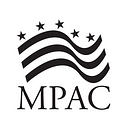By: MPAC Policy Bureau
As we reflect on the first Friday prayer of this Ramadan, having been unable to congregate together for the past two years it is important for us to remember the importance of community in our faith and the directive we are given as Muslims to partake in it.
Islam has many individual components which are of utmost importance, but it also places great importance on the value of community life and involvement for the Muslim. We see this in the form of Friday congregational prayers (jummah). Simply put, once a week, we get together, pray together, and engage one another.
Throughout the Quran, we can find verses on forging strong ties with our fellow community members and our duties toward each other and toward God as one, unified community.
One of the hallmarks of community life are of course the Friday congregational prayers. Prayers with a group gathering and in mosques are encouraged and are treated with special regard. Here, we see the strengthening and upliftment of spirit by finding solace that we are together and with one another. One of the benefits of community involvement is the assurance and encouragement found in striving for goodness and worshipping God in unity with the greater community of Islam, gathering in mosques nationwide and globally.
Our faith institutes learning, growth, and supporting one another. We take inspiration from our fellow Muslims in our spirituality and faith. We develop deep bonds of friendship and family with one another through coming together, an important and key aspect of human life and fulfillment itself, which our faith strongly advises us to do.
Having such a vast and diverse community network provides benefits in many other aspects of our lives, beyond faith and our social lives, in our careers, businesses, and work lives as well, which further strengthens our ties and allows us to grow as a community.
Perhaps most notable and recognizable is the yearly occurrence of Hajj, the pilgrimage to Mecca in which Muslims the world over converge upon one place together in unison and assume identical circumstances regardless of background and privilege and conduct the same rituals in worship of the one God. It is perhaps the greatest act of human beings coming together for a common purpose, in solidarity, and in love of one another — and it occurs every year. This too allows for a great exchange of information, the building of relationships, and the building of ties of kinship, community, with one another of a scale unmatched since its inception nearly 1400 years ago proceeding to the present-day.
The Quran says, “We have made you nations and tribes so you may get to know one another” (49:13). Here, we are told not only to come together, but to learn from one another and become intimate and known to each other in a deep way.
In the spirit of giving and community-building, Muslims also dedicate a portion of their income and wealth to support both members of our own community and organizations that work to advance our communities.
In this time, as the world emerges from COVID, one of the things we have come to appreciate is the ability and heartening feeling of being able to be present for a Friday sermon together, glean its wisdom, and pray in congregation. Breaking our fast with family and friends and making the Ramadan nighttime prayers together again is a privilege. Let us this Ramadan reflect on and appreciate this aspect of our lives which we may have taken for granted and the fruits and benefits it yields us.
